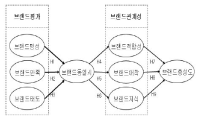
This study is aimed at identifying the relationship among brand evaluation, brand identification, brand relationship, and brand loyalty towards professional baseball title sponsors in an empirical manner. The target of this study is 'Korea Yakult,' a baseball title sponsor in 2014. A survey was conducted on 377 home crowd members of Nexen, Doosan, LG and SK based in metropolitan regions. Sampling method was Convenience Sampling Mode, and questionnaire has been structured to be self-administerd type. SPSSWIN Ver. 21.0 and AMOS 18.0 have been used for data processing. The findings are as follows. First, the brand reputation had a significant impact on brand identification. Second, the brand satisfaction had no significant impact on brand identification. Third, the brand attitude had a significant impact on brand identification. Fourth, the brand identification had a significant impact on brand suitability. Fifth, the brand identification had a significant impact on brand attachment. Sixth, the brand identification had a significant impact on brand knowledge. Seventh, the brand suitability had a significant impact on brand loyalty. Eighth, the brand attachment had a significant impact on brand loyalty. Ninth, the brand knowledge had a significant impact on brand loyalty.

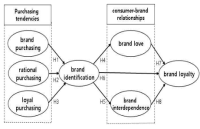
The purpose of this study was to investigate the relationships among purchasing tendencies, brand identification, consumer-brand relationships, and brand loyalty by analyzing structural equation model. A survey was conducted by using members(n=220) of 8 sport clubs located in Chungcheong Province. The data were recorded and analyzed using the SPSSWIN Ver. 21.0 and AMOS 18.0 to analyze the structural equation model. The findings of this study were as follows: First, brand purchasing had a significantly negative effect on brand identification. Second, rational purchasing was found to impact significantly on brand identification. Third, loyal purchasing did not show significant impact on brand identification. Firth, brand identification was found to significantly influence on brand love, brand interdependence, and brand loyalty. Fifth, brand love had no positive impact on brand loyalty. Finally, interdependence was found to impact significantly and positively on brand loyalty.

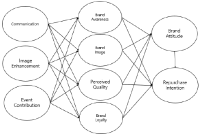
Purpose The purpose of this study was to provide title sponsorship marketing strategies by defining the relationship between professional volleyball title sponsorship, brand equity, brand attitude, and repurchase intention. Methods This study distributed 390 questionnaires to 2018-2019 V-League audiences and a total of 313 questionnaires were used as final validity sample. For data analysis, SPSS 21.0 and Amos 18.0 were used for frequency analysis, reliability analysis, confirmatory factor analysis, and structural equation analysis. Results First, title sponsorship had significant influence on brand equity, therefore hypothesis 1~3 were accepted, except for 1-3(perceived quality) and 1-4(brand loyalty). Second, among brand equity subfactors, hypothesis 4-1(brand awareness) and 4-4(brand loyalty) had significant influence on brand attitude which made hypothesis 4 partially accepted . Third, among brand equity subfactors, only brand image(hypothesis 5-2) had significant influence on repurchase intention which made hypothesis 5 partially accepted. Lastly, brand attitude had significant influence on repurchase intension, which made hypothesis 6 accepted. Conclusions It is anticipated that based on the result of the study, effective marketing strategy can be developed for title sponsorship companies in the future.

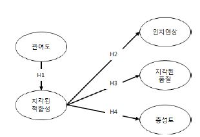
Although mega sporting events are becoming an effective means of brand communication, there has not been systematic research on involvement development and perceived fit enhancement through the sporting events. This study developed and tested a conceptual model delineating the impact of consumer involvement on perceive fit, and brand equity in mega sporting event context. Using quota sampling method, 1,847 participants (916 from IAAF; 931 from the F1) were recruited from several different cities in Korea during the mega-sporting events. Structural equation modeling were employed to examine the relationship between research constructs and test the model respectively. The study found that mega event involvement has a positive effect on perceived fit; and perceived fit influences brand equity(brand awareness, perceived quality and loyalty) toward event sponsor brands. The direct effects of involvement on sponsorship effectiveness (brand awareness, perceived quality and loyalty) did not have a significant effect on brand equity. The findings also reveal the mediating effect of perceived fit on brand equity.

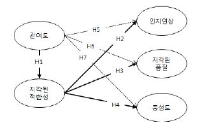
PURPOSE The purpose of this study was to investigate the relationship between the integrated marketing communication (IMC) attribute of professional baseball teams, their fans’ perceived value, and voluntary behavior related to the parent company. METHODS In this study, the target population consisted of spectators watching a professional baseball game. A survey was conducted on 360 fans watching the KIA tigers’ and kt wiz’ home game using the convenience sampling method. Finally, a total of 261 were used for data analysis, and frequency, confirmatory factor, reliability, correlation, structural equation model analyses using SPSS 20.0 and AMOS 20.0. RESULTS Main findings are as follows: First, interactivity of professional baseball teams’ IMC had positive effects on the emotional value. Second, interactivity and reminders from the parent companies of professional baseball teams’ IMC had positive effects on social value. Third, stakeholder connectivity and reminders from parent company of professional baseball teams’ IMC had positive effects on altruistic value. Fourth, with regard to the social aspect, the fans’ perceived value had positive effects on loyalty, customer participation and customer cooperation of voluntary behavior related to parent company. Lastly, with regard to the altruistic aspect, the fans’ perceived value had positive effects on customer cooperation of voluntary behavior related to the parent company. CONCLUSIONS Therefore, professional baseball teams should identify the IMC elements that fans perceive as important and establish effective marketing communication strategies to enhance the perceived value of their brand among their fans, ultimately increasing their voluntary engagement with the parent company.